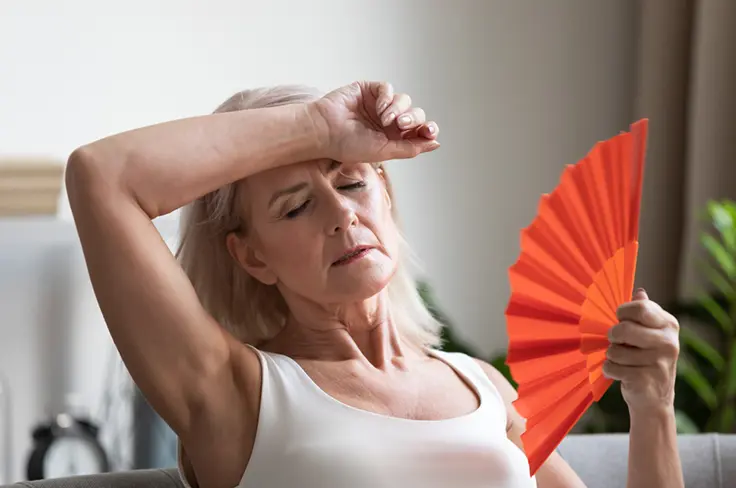
Women's health - What do women have to pay particular attention to?
Women's health - what do women have to pay particular attention to?
Women's health is a topic that is mostly neglected in our society. Women often don't even know what to look out for. Women should be aware that they not only have a different anatomical structure than men, but also different health needs. In this blog post we will list some important aspects of women's health and what steps women can take to improve their health, prevent diseases and improve their lifestyle.
Regular gynecological examination

Women should have regular pelvic exams to monitor and maintain their reproductive health. The examinations help to identify and treat possible health problems at an early stage.
For example, it is possible to identify serious illnesses such as Cervical cancer early detection. The following applies to many diseases: the earlier they are detected, the easier and more effectively they can be treated.
Pynecological exams can also help ensure a healthy pregnancy and to reduce the risk of contraceptive errors. Early detection and treatment of gynecological problems such as infections can also help prevent serious health complications.
Breast examination
It is important for women to have regular breast examinations to detect early changes that could indicate breast cancer. Breast cancer is by far the most common cancer in women. That's why every woman should take the time to check her breasts once a month.
Early diagnosis increases the chance of successful treatment. Because the earlier breast cancer is detected, the better the chances of recovery. Regular self-examinationscan also help women to become more aware of their own physical health and to be able to recognize changes in tissue more quickly.
You should pay attention to this when examining the breast:
- Has the size of the breast changed?
- Can you see any irregularities?
- Is the tissue more knotty than usual?
- Can you feel a painful area?
Don't forget the areas towards the collarbone and armpit.
Note iron requirements
During menstrual bleeding, women have an increased need for iron. Women also have a higher iron requirement than men during pregnancy and breastfeeding.
Iron is an important mineral that is essential for the health and function of the body. It is responsible for the formation of red blood cells and hemoglobin, which are necessary for the oxygen supply of the cells. In addition, iron also plays an important role in our immune system, energy production and cell division in our body and contributes to normal cognitive function.
Iron deficiency can cause unpleasant symptoms entail. Typical symptoms include fatigue, loss of appetite, difficulty concentrating and dizziness.
Of course, it is also possible to meet your needs through food. A balanced diet with iron-rich foods such as red meat, poultry, legumes, nuts, seeds, whole grain products and green leafy vegetables helps here.
If a deficiency is suspected, a test is possible. If there is an increased need for iron or if a deficiency has been determined that cannot be compensated for through diet, an iron supplement can also be used in consultation with the doctor.
Enough sleep

Sleep is an important aspect of health and well-being. Busy women often have a busy daily routine, which is associated with many obligations and responsibilities. A good night's sleep can help maintain physical and mental health.
Adequate sleep is also important for the immune system and cognitive abilities , including focus, memory and learning ability.
There are some tips women can follow to improve the quality of their sleep. One step is creating an optimal sleeping environment. This includes a comfortable mattress and bed linen, a pleasant room temperature and little or no lighting so that the sleep hormone melatonin can build up more. Turning off electronic devices like cell phones, laptops, and tablets can also help improve sleep.
Regular bedtimes and sleep rituals can also help to promote healthy sleep. This includes avoiding stimulants like caffeine and alcohol late at night. Practicing relaxation exercises such as yoga or meditation has a relaxing effect and promotes restful sleep.
Average values for the sleep requirements of women:< /div>
- 14 to 17 years: 8 to 10 hours
- 17 to 50 years: 7 to 9 hours
- Between 55 and 60 years: 6.5 hours
- Over 80 years: 6 hours
However, individual sleep requirements can vary greatly. Every woman should therefore listen to her own body and give it as much rest and sleep as it needs.
Osteoporosis
Osteoporosis is a disease that affects the bones. Bone mass decreases, making the bones more prone to fracture. The disease is widespread among women. Women have a higher risk of developing osteoporosis due to their lower bone mass and the influence of hormonal changes over the course of their lives.
Especially after menopause, women naturally have less bone mass than men.
A balanced diet, which is rich in calcium and vitamin D, contributes to the maintenance of normal bones. Foods like dairy products, green leafy vegetables, fish, and eggs are good sources of calcium and vitamin D. Regular physical activity, especially weight training and exercises that put stress on the bones, can also help increase bone density and reduce the risk of fractures . Smoking and excessive alcohol consumption should also be avoided.
Wechseljahre

Menopause, also known as menopause, is a natural stage in a woman's life, usually occurring between the ages of 45 and 55.
The menopause are a natural transition in which a woman's body begins to transition from the reproductive phase to say goodbye. The main reason for this is a drop in hormone production, especially estrogen and progesterone.
The symptoms of menopause can be very different and vary from woman to woman. Some of the most common symptoms are hot flashes, night sweats, mood swings, weight gain, dry skin and mucous membranes, and trouble sleeping.
There are several ways to manage menopause and relieve its symptoms.
One of the most effective methods is hormone replacement therapy .: Hormone Replacement Therapy - HRT), which balances hormone production in a woman's body. However, there are other options, such as herbal remedies, acupuncture, or lifestyle changes such as a healthy diet and regular exercise.
It's also important to hang out with friends and family about menopause and seek support from a doctor or therapist if needed. Many women find it helpful to join a support group or seek counseling to share their feelings and experiences with others.
Overall, the Women's health is an extremely important issue that has both individual and societal implications. Women should be aware of their specific health needs and listen to their own bodies. This often signals when something is missing. These signals should not be ignored but taken seriously. In addition, regular medical examinations are generally essential for a healthy life. Because at the end of the day: prevention is better than aftercare!


